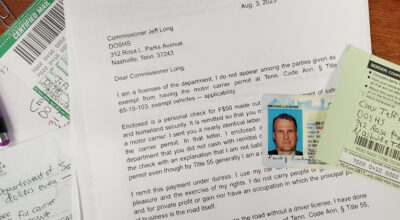
CHATTANOOGA, Tenn., Wednesday, Aug. 9, 2023 — My lawsuit against the city of Franklin and the state’s chief Justice has failed in its initial errand to crack the door of state judicial secrecy and to halt general warrants in Tennessee.
By David Tulis / NoogaRadio Network
General are a major support structure for structural police-industrial racism and Jim Crow in Tennessee.
Such “warrants” are really just custom. The policy lets police arrest a person for cause without a warrant. The general warrant scheme statewide allows immediate arrests of thousands of people who might otherwise be arrestable only under a warrant issued by judge under a complicated and time-consume protocol required under the Tennessee constitution. Across the state, and in the city of Franklin that I sued, cops make just a single test to make a warrantless arrest. Without a required second test, cops can arrest anyone at anytime without judicial supervision. Just like under commies!
Black people, and white people alike, accept this state of affairs without protest, and without any interest in supporting the claims I make in U.S. district court in Nashville. Judge Waverly Crenshaw blocks my project in Tulis v. Orange following my false imprisonment and false arrest covering the Tennessee judicial conference Nov. 6, 2021.
Judge Crenshaw dismisses my case on grounds of a serious procedural flaw, as he identifies it. That is my failure to amend my complaint for new insights into my injury that came into view only later in the proceedings. Defendants said I had not timely filed. I worked to show I had timely filed, resorting to a backup position that truly is stronger than my initial defense of timely filing. These strong arguments are that the citation statute is unconstitutional, and that my imprisonment for booking is a continuation of the harm imposed on the date of the arrest.
Cases must be filed within a year of the harm. Was my harm only on one day? Or was it extended to my trip to Williamson County for booking?
From all appearances on a first read, it appears my failure to amend means that I cannot claim the second harm (jailing, booking) as part of my complaint, and hence waived.
I handled the case myself when, in the last month remaining in which to file, I determined no attorney would help me. I’d contacted with 52, and talked some detail with about a dozen. The judge says the 79 ½ hour advantage an attorney-filed case has over me, is a fiction, citing the filing deadline rule that says the complaint must be in the clerk’s hands no later than one year out from the tort.
I have 26 days left to appeal to the U.S. court of appeals in Cincinnati.
I ask for prayer’s, God’s guidance and wisdom, and means to handle this case while I have two others in progress.
➤ Flexibility Capital vs. Cupelli & Tulis. In the appeal of this defeat in Hamilton County circuit under Judge Kyle Hedrick, I contend the contract was an unenforceable usury loan and not an advance purchase of future receivables, and that the lawsuit gives the court no subject matter jurisdiction to hear the case. The limit on usury in Tennessee is 10 percent. The usury in this case is 208.05 percent, defended by Cheadle Law in Nashville, a debt collector scourge in the state. I allege that Judge Hedrick joined in a fraud on the court by the plaintiff — a serious charge of breach of judicial ethics.
➤ Tulis v. Gerregano. I have given notice of my suit inside the department of revenue that David Gerregano, commissioner, is defrauding me and the entire public in Tennessee in enforcing the financial responsibility law as if Tennessee were a mandatory insurance state. It’s not. It’s an after-crash state, according to Tenn. Code Ann. § 55-12-101 et seq and at least four court rulings describing how the law works. A 2015 amendment to the law did not cause any shift. Fraud, oppression, malfeasance, tort and other offenses are afoot. No date has been set, nor have filings and briefs begun.
Technical bodyblow in Tulis reform suit


There are two things that statutory persons don’t have. A voice and rights. They will continue to ignore you for as long as you keep fighting them, and the criminals in robes will continue to let them off the hook.